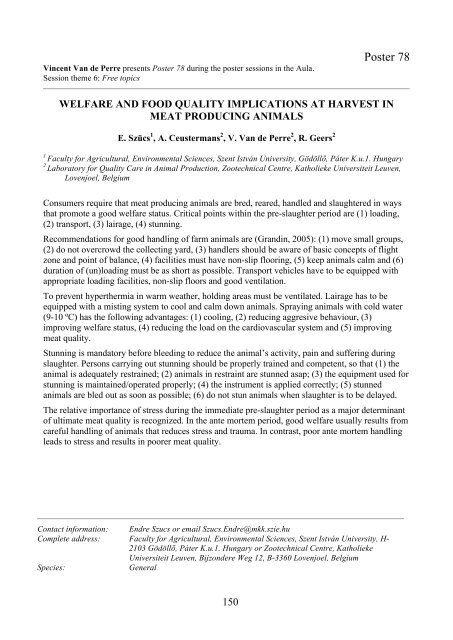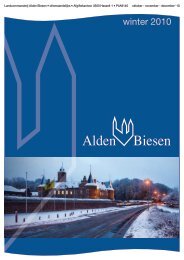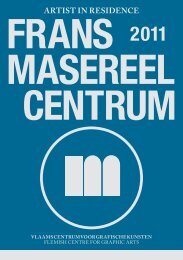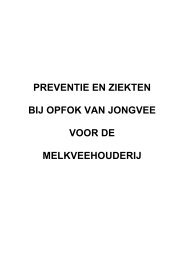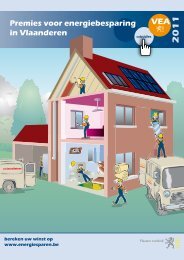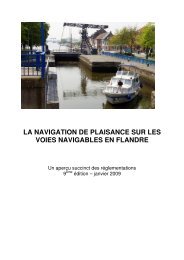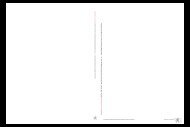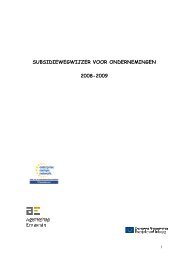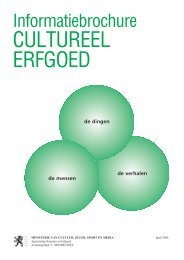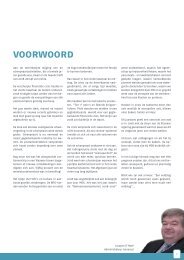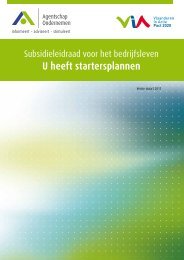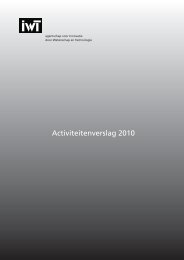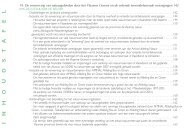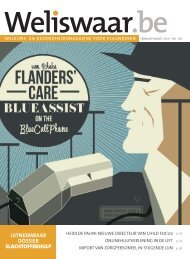Acknowledgements Book of abstracts - Publicaties - Vlaanderen.be
Acknowledgements Book of abstracts - Publicaties - Vlaanderen.be
Acknowledgements Book of abstracts - Publicaties - Vlaanderen.be
You also want an ePaper? Increase the reach of your titles
YUMPU automatically turns print PDFs into web optimized ePapers that Google loves.
Vincent Van de Perre presents Poster 78 during the poster sessions in the Aula.<br />
Session theme 6: Free topics<br />
150<br />
Poster 78<br />
WELFARE AND FOOD QUALITY IMPLICATIONS AT HARVEST IN<br />
MEAT PRODUCING ANIMALS<br />
E. Szücs 1 , A. Ceustermans 2 , V. Van de Perre 2 , R. Geers 2<br />
1 Faculty for Agricultural, Environmental Sciences, Szent István University, Gödöllő, Páter K.u.1. Hungary<br />
2 Laboratory for Quality Care in Animal Production, Zootechnical Centre, Katholieke Universiteit Leuven,<br />
Lovenjoel, Belgium<br />
Consumers require that meat producing animals are bred, reared, handled and slaughtered in ways<br />
that promote a good welfare status. Critical points within the pre-slaughter period are (1) loading,<br />
(2) transport, (3) lairage, (4) stunning.<br />
Recommendations for good handling <strong>of</strong> farm animals are (Grandin, 2005): (1) move small groups,<br />
(2) do not overcrowd the collecting yard, (3) handlers should <strong>be</strong> aware <strong>of</strong> basic concepts <strong>of</strong> flight<br />
zone and point <strong>of</strong> balance, (4) facilities must have non-slip flooring, (5) keep animals calm and (6)<br />
duration <strong>of</strong> (un)loading must <strong>be</strong> as short as possible. Transport vehicles have to <strong>be</strong> equipped with<br />
appropriate loading facilities, non-slip floors and good ventilation.<br />
To prevent hyperthermia in warm weather, holding areas must <strong>be</strong> ventilated. Lairage has to <strong>be</strong><br />
equipped with a misting system to cool and calm down animals. Spraying animals with cold water<br />
(9-10 ºC) has the following advantages: (1) cooling, (2) reducing aggresive <strong>be</strong>haviour, (3)<br />
improving welfare status, (4) reducing the load on the cardiovascular system and (5) improving<br />
meat quality.<br />
Stunning is mandatory <strong>be</strong>fore bleeding to reduce the animal’s activity, pain and suffering during<br />
slaughter. Persons carrying out stunning should <strong>be</strong> properly trained and competent, so that (1) the<br />
animal is adequately restrained; (2) animals in restraint are stunned asap; (3) the equipment used for<br />
stunning is maintained/operated properly; (4) the instrument is applied correctly; (5) stunned<br />
animals are bled out as soon as possible; (6) do not stun animals when slaughter is to <strong>be</strong> delayed.<br />
The relative importance <strong>of</strong> stress during the immediate pre-slaughter period as a major determinant<br />
<strong>of</strong> ultimate meat quality is recognized. In the ante mortem period, good welfare usually results from<br />
careful handling <strong>of</strong> animals that reduces stress and trauma. In contrast, poor ante mortem handling<br />
leads to stress and results in poorer meat quality.<br />
Contact information: Endre Szucs or email Szucs.Endre@mkk.szie.hu<br />
Complete address: Faculty for Agricultural, Environmental Sciences, Szent István University, H-<br />
2103 Gödöllő, Páter K.u.1. Hungary or Zootechnical Centre, Katholieke<br />
Universiteit Leuven, Bijzondere Weg 12, B-3360 Lovenjoel, Belgium<br />
Species: General


